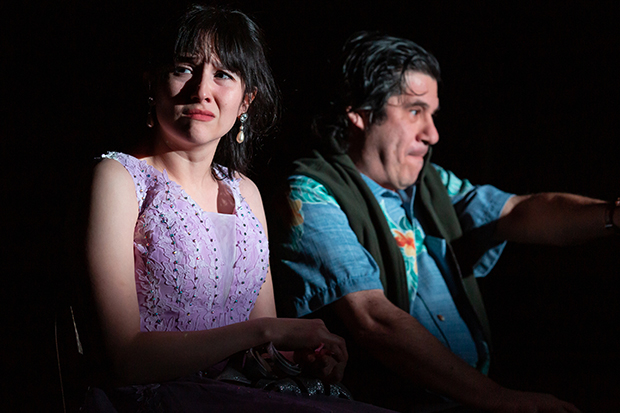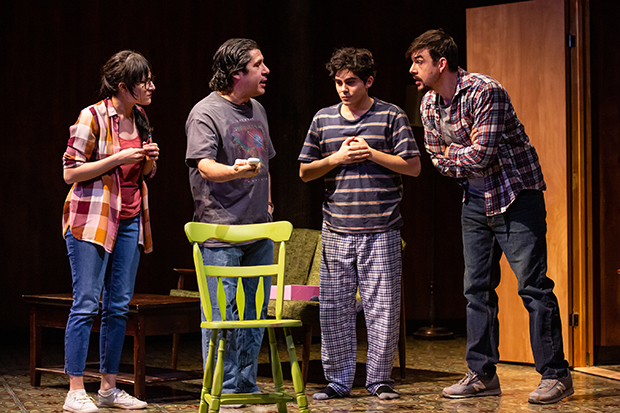Our Southern Border Separates an American Family in 72 Miles to Go…
In this world premiere, playwright Hilary Bettis dramatizes a heartbreaking case of ”so close, yet so far away.”

(© Jeremy Daniel)
I'm fairly certain that my great-great-great-great-grandfather committed immigration fraud. While he listed "Pennsylvania" as his place of birth on government documents, it is a poorly kept family secret that he was actually born on the St. Lawrence River during the final stretch of his parents' Atlantic passage (his middle name, "Canada," is a big tell). If you dig a little, you'll find that a lot of families have similar stories, in which the messiness of American life fails to fit perfectly within the strictures of American law. That's the subject of Hilary Bettis's subtly profound 72 Miles to Go…, which is now making its world premiere with Roundabout Theatre Company.
It tells the story of one American family, separated by 72 miles of desert and the Mexican-American border. Anita (Maria Elena Ramirez) was deported to Nogales, Mexico, in 2008, but her American husband, Billy (Triney Sandoval), and their two kids, Eva (Jacqueline Guillén) and Aaron (Tyler Alvarez), still live in Tucson, Arizona. Christian (Bobby Moreno), Anita's son from a previous relationship, also resides in Tucson, where he lives in fear of deportation. The family stays in touch with Mom through phone calls. Even though she is married to an American citizen, Anita is barred from entering the United States for 10 years, a decade that will see her younger children enter adulthood and her eldest start a family of his own. These are milestones that cannot be fully enjoyed via speakerphone.

(© Jeremy Daniel)
This is despite a surprisingly fleshy performance from Ramirez, who does not appear physically onstage until the final scene. Instead, we just hear her voice, which envelops the stage in a bear hug, no matter how crappy the connection (Elisheba Ittoop's sound design, which allows us to hear Anita perfectly through a flimsy flip phone, constitutes the most fantastical aspect of the play).
Sympathetic performances convey how each character survives this unpleasant arrangement: As played by Sandoval, Billy's loneliness is tempered by dad jokes and a gentleness of spirit (a scene in which he and Anita express regret over having children is hugely uncomfortable in its honesty). Guillén embodies Eva's strength as she prepares dinner and implores her brothers to get dressed hours before she is scheduled to deliver the valedictory at her high school graduation; she has to do the work of both sister and mother. Alvarez's Aaron undergoes the biggest transformation in the play, from awkward teen to US Marine. By the end, he felt like an entirely different character to me — and perhaps to Anita too.

(© Jeremy Daniel)
As his younger siblings pass into their adult lives, Christian seems to be stuck in limbo. He was born in Mexico to Mexican parents, but crossed into Arizona at a young age. He doesn't speak Spanish, and the only person he knows in Mexico is his mom; but if he's arrested by ICE, that is where he's going. Moreno (who is married to the playwright) gives us a visceral sense of Christian's predicament with a performance that radiates anxiety, even in the most seemingly innocuous situations. And considering that it was a broken tail light that led to his mother's removal from the country, his fears are absolutely justified.
Danger lurks behind the mundane in director Jo Bonney's unexpectedly fraught production. Rachel Hauck's set depicts the family's unremarkable (and out-of-date) lower-middle-class living room-cum-kitchen (a later scene depicting Christian's house in the exact same space is somewhat confusing). Lap Chi Chu's lighting has the potential to transform the stage in ways that are pleasant (a stained-glass effect transports us to a Unitarian church) and troubling (when we see flashing police lights through the front door and brace for impact). From Christian's dirt-caked jeans to Eva's medical smock to Aaron's Marine uniform, Emilio Sosa's unglamorous costumes reveal the simple truth: These are hardworking people who just want to be left alone by the federal government, and yet circumstance has made them outlaws.

(© Jeremy Daniel)
Inevitably, some viewers will respond that the events depicted in 72 Miles to Go… could have been avoided if Anita had only entered the United States "the right way." With sensitivity and insistence, Bettis shows how prohibitive "the right way" really is, and how it requires sacrifices that few native-born Americans would ever tolerate. And, of course, if we look into our own family histories, we might discover that our ancestors didn't tolerate them — that doing everything "the right way" constitutes the road less traveled in this nation of mavericks.











